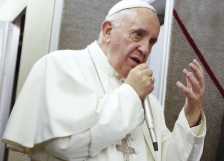Pope Francis could rewrite the Catholic doctrine and "alter Catholicism" itself as he continues to push through his plan to allow divorced and remarried Catholics to receive communion even before they get an annulment, New York Times columnist Ross Douthat says.
Over the weekend, Pope Francis made known his intent to radically changed Catholicism itself when he called for a "revolution" in the concept of the Catholic Church. He said the Holy See should not be a top-down organisation with the pope in charge but rather an inverted pyramid where the summit — the pope — is below and in service to the "holy faithful people of God" at the top, according to an Associated Press report.
In his op-ed commentary, Douthat says the pope could name an advisory body "rigged" to approve his proposal in the ongoing synod of bishops on the family.
"Procedurally, the pope's powers are near-absolute: If Francis decided tomorrow to endorse communion for the remarried, there is no Catholic Supreme Court that could strike his ruling down," Douthat writes.
The conservative journalist believes that the pope is "clearly looking for a mechanism that would let him exercise his powers without undercutting his authority."
This mechanism, he says, can be provided by the bishops' synod, the papal advisory body that "can project an image of ecclesiastical consensus."
Douthat says as it is the "church's teaching that marriage is indissoluble has already been pushed close to the breaking point" when Pope Francis decreed an expedited annulment process.
To ensure the success of his plan, Douthat points to the claim made by Vatican journalist Edward Pentin who wrote in his recent investigative book that the synod has been "rigged" by organisers appointed by the pope "in favour of the pope's preferred outcome."
But despite all the scheming, Douthat believes the pope might not succeed in pushing through his plan. "There reportedly still isn't anything like a majority for the proposal within the synod," he writes.
The Associated Press also says that the synod on family issues is unlikely to endorse any changes in church doctrine on the church's teaching about homosexuality or whether civilly remarried Catholics can receive Communion.
"And yet, it seems, everything has changed," an AP report says.
"From the crucial role African bishops have played in the debate, to calls to remove 'intrinsically disordered' from the church's language on gays, to the freedom bishops now enjoy to speak their minds on once-taboo issues, Francis' synod on the family has at the very least shaken up the church for years to come," AP says.
Over the weekend, Pope Francis made known his intent to radically changed Catholicism itself when he called for a "revolution" in the concept of the Catholic Church. He said the Holy See should not a top-down organisation with the pope in charge but rather an inverted pyramid where the summit — the pope — is below and in service to the "holy faithful people of God" who are its base.
Pope Francis called for a "healthy decentralisation" of authority on certain problems.
He said the papacy itself should be rethought, with the pope guiding the church but really just one bishop among many, one Catholic among many, according to AP.
"It's a very delicate moment, where you realise that the relationship between the church and the world is at stake," said Rev. Antonio Spadaro, a Jesuit close to Pope Francis, as the synod entered its third and crucial week this week.














